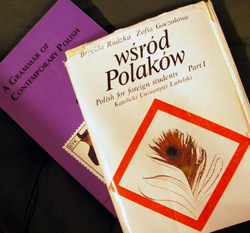Teach and Learn Polish Posted by Anna on Jan 3, 2009 in Grammar
 I was talking to my friend today, and as always, she does her best to express herself in Polish. She’s been studying the language for quite some time now, and generally does a very good job when writing in Polish. However, when it comes to speaking, things can get a bit confusing at times.
I was talking to my friend today, and as always, she does her best to express herself in Polish. She’s been studying the language for quite some time now, and generally does a very good job when writing in Polish. However, when it comes to speaking, things can get a bit confusing at times.
Today she was explaining to me that she got a new job.
She: “Mam nową pracę.” – I have a new job!
Me: “Świetnie! Gdzie?” – Great! Where?
She: “W szkole średniej.” – In a high school.
She: “Będę uczyć się matematyki.” – I’ll be learning (studying) math.
Huh?
Of course what she meant to say was:
- Będę uczyć matematyki. – I’ll be teaching math.
However, by adding that pesky reflexive “się” in Polish, the sentence got a totally different meaning.
I explained it to her, and she said it probably came from the fact that she’d been saying “Uczę się polskiego” (I’m learning Polish) for a very long time.
You see, while “się” following a verb tells us it’s a reflexive verb, some of those verbs can and do exist without “się” as well. And some of those verbs without “się” actually mean something else in English than their “się” equivalents.
I hope I didn’t totally confuse you now.
Just take a look:
- uczyć się – to learn, to study
- uczyć – to teach
This is a very common mistake even for Poles who learn English. While Polish students confuse “learn” and “teach” their foreign counterparts get stumped by uczyć and uczyć się.
We will talk more about “się” very soon. It’s a very handy word, as you’ll see.
For now, I’ll give you all the “uczyć (się)” verb forms.
Future tense:
- ja – będę uczyć (się) or będę uczyła (się) / uczył (się) (fem. / masc.)
- ty – będziesz uczyć (się) or będziesz uczyła (się) / uczył (się) (fem. / masc.)
- on – będzie uczyć (się) or będzie uczył (się)
- ona – będzie uczyć (się) or będzie uczyła (się)
- ono – będzie uczyć (się) or będzie uczyło (się
- my – będziemy uczyć (się) or będziemy uczyły (się) / uczyli (się) (fem. / masc.)
- wy – będziecie uczyć (się) or będziecie uczyły (się) / uczyli (się) (fem. / masc.)
- oni – będą uczyć (się) or będą uczyli (się)
- one – będą uczyć (się) or będą uczyły (się)
present tense:
- ja – uczę (się)
- ty – uczysz (się)
- on/ona/ono – uczy (się)
- my – uczymy (się)
- wy – uczycie (się)
- oni/one – uczą (się)
past tense:
- ja – uczyłam (się) / uczyłem (się) (fem. / masc.)
- ty – uczyłaś (się) / uczyłeś (się) (fem. / masc.)
- on – uczył (się)
- ona – uczyła (się)
- ono – uczyło (się)
- my – uczyłyśmy (się) / uczyliśmy (się) (fem. / masc.)
- wy – uczyłyście (się) / uczyliście (się) (fem. / masc.)
- oni – uczyli (się)
- one – uczyły (się)
And as you can see, this is an imperfective verb, because it occurs in all three tenses.
Also, it’s more or less regular, and I’m sure by now, if you’ve followed our verb posts, you can spot the pattern of how the regular verbs change according to person (ja, ty, on, etc.) and number (plural and singular) in all the tenses.

Build vocabulary, practice pronunciation, and more with Transparent Language Online. Available anytime, anywhere, on any device.




Comments:
lycia:
Dear Anna,
Happy New Year to you and your family. Buon Anno!!!
take care. lycia
Basia Lomnicka:
Czesc:
Thrilled to hear we will be tackling “sie”. I am never sure whether to place it in front of the verb or after. Getting it “right” would be a great quick fix and make me seem less pathetic when I’m writing.
Cheers,
Barb
Patricia:
I am trying to learn Polish.
I need to have the word in English and Polish also the Polish to be broken down on how it is pronounced.
Thank You
Patrycja
Anna:
Hi Lycia!
Happy new Year to you too!
Barb – yes, “się” is coming up. Or at least part one of “się.”
Patricia – I’ll add the audio when I have a minute. I promise!
🙂
Patricia:
Thank You (dziekuje) I am looking forward to audio.
Patricia
Ronald Small:
Dear Anna,
On your Jan 03 blog you had pictures of the
books Wsrod Polakow and a grammar of Contemporary Polish. I would like to hear your comments about these textbooks.
Anna:
Hi Ron!
Yes, thanks for reminding me – I am working on a post reviewing these books.